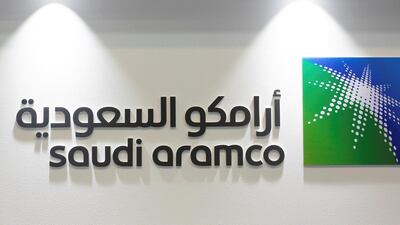Saudi Aramco, the world's biggest oil producer, transformed its legal structure into a joint-stock company this month signalling its seriousness to move ahead with its 5 per cent stake sale plan that may make it the world's largest publicly traded company.
"This is one of the key steps they need to take to allow third party investors through the door and this is probably one of the most significant milestones when it comes to the actual IPO process," said Oliver Shutzmann, chief executive officer of Iridium, a Dubai investor relations firm.
“This is one of the signals that they are probably on track to do this properly and from here onward they really have people’s attention.”
If Aramco sells a 5 per cent stake that is valued at US$100 billion, it would give the company a valuation of $2 trillion, making it more than twice as valuable than Apple, currently the world's largest publicly traded company at more than $900bn.
Transforming Aramco into a joint stock company means that other investors can buy and sell shares of the company.
The next step for the company would be to issue a prospectus, detailing where the initial public offering will be listed as well as the financial details of the sale, investor relations professionals and lawyers said. The company is said to be considering New York, London and Hong Kong for a dual listing as well as one on the Tadawul stock exchange in Saudi Arabia.
__________
Read More:
Saudi Arabia converts Aramco into joint-stock company ahead of historic IPO
Saudi Aramco launches maritime complex JV with local and international partners
___________
“They will have to choose the listing venue before doing the real detailed prospectus because each jurisdiction will have its own different requirements for disclosure but they are all relatively high,” said Andrew Tarbuck, partner at Hogan Lovells, an international law firm.
“Due diligence would have been the start of the process, then converting the company into a joint stock company, it will then be drafting your prospectus and getting that approved by authorities. Then you proceed to marketing.”
The Middle East and North Africa region recorded five IPOs in the third quarter of 2017, up from a single listing in the same period a year earlier with more offerings expected this year thanks to the recovery in oil prices, according to consultancy EY.
The value of IPOs in the third quarter rose 20 per cent to $236.7 million from a year-earlier period, led by three offerings on the Saudi Stock Exchange or Tadawul, according to EY.
Privatisation lies at the heart of the economic overhaul of Saudi Arabia which still relies heavily on the sale of hydrocarbons for revenues. Riyadh is encouraging foreign investments in both government and private sector companies. The stake sale of Aramco is part of a wider series of measures the Saudi Arabian government is taking to shore up public finances in the wake of the 2014 oil price crash. Plans also include reducing energy subsidies and implementation of new taxes such as value added tax.
Saudi Arabia stands to earn as much as 80bn Saudi riyals (Dh78.29bn) from non-oil revenues this year after the introduction of VAT, an expatriate worker tariff and the possible introduction of a levy on luxury goods, the investment lender Bank of America Merrill Lynch said last year.
Analysts said the stake sale of Aramco may encourage other governments in the region to follow suit. Some, such as the gas station operator Adnoc Distribution in Abu Dhabi, have already sold shares to the public in recent months.
“There’s so much privatisation work that could kick start the region’s markets because there are so many government businesses or part-owned by the government,” Mr Tarbuck said. “It’s such a good opportunity to put these companies on the markets and boost the depth of the markets. I think the level of disclosure that is going to come out will encourage other governments to use it as a kickstart for privatising government related entities via public capital markets.”

